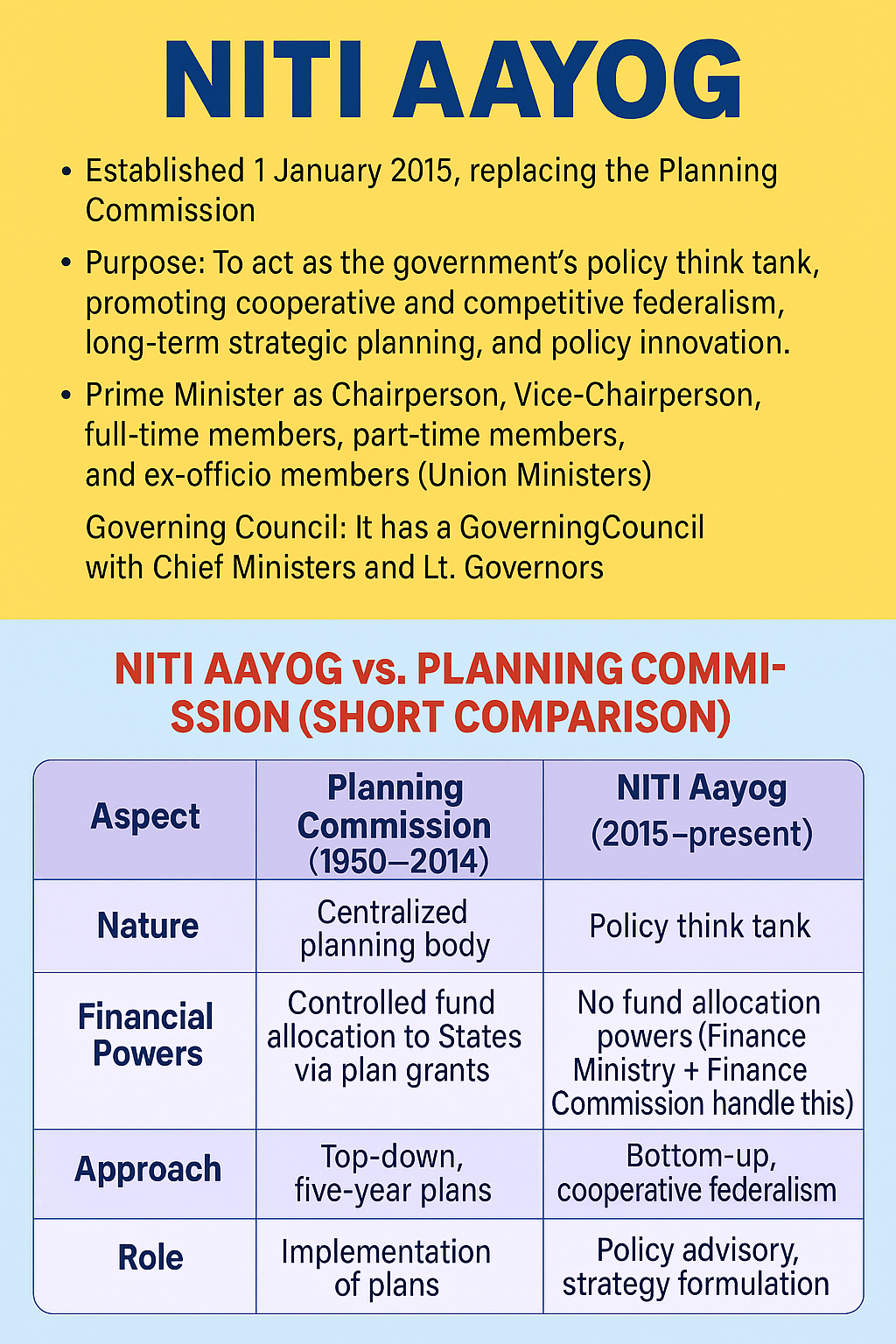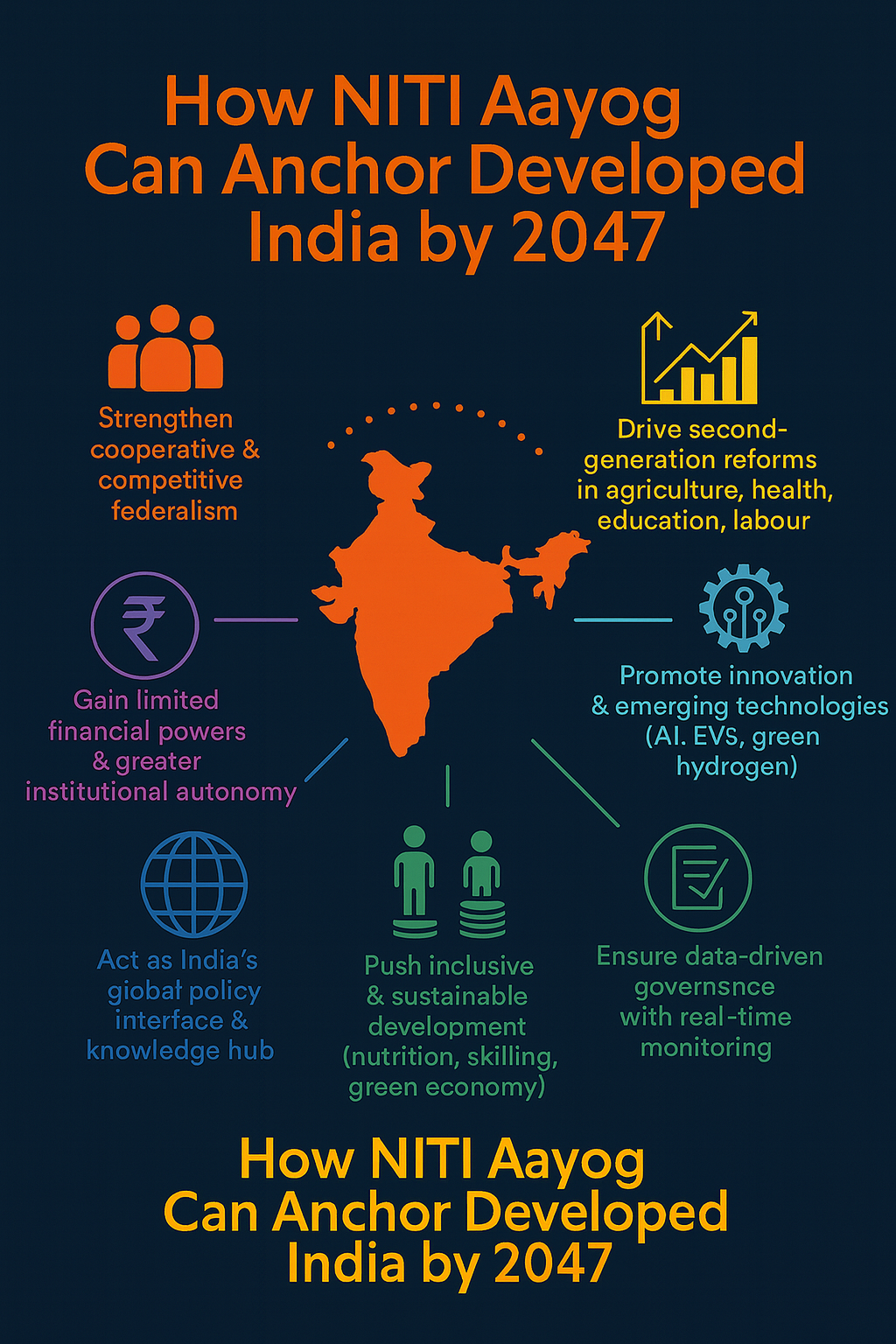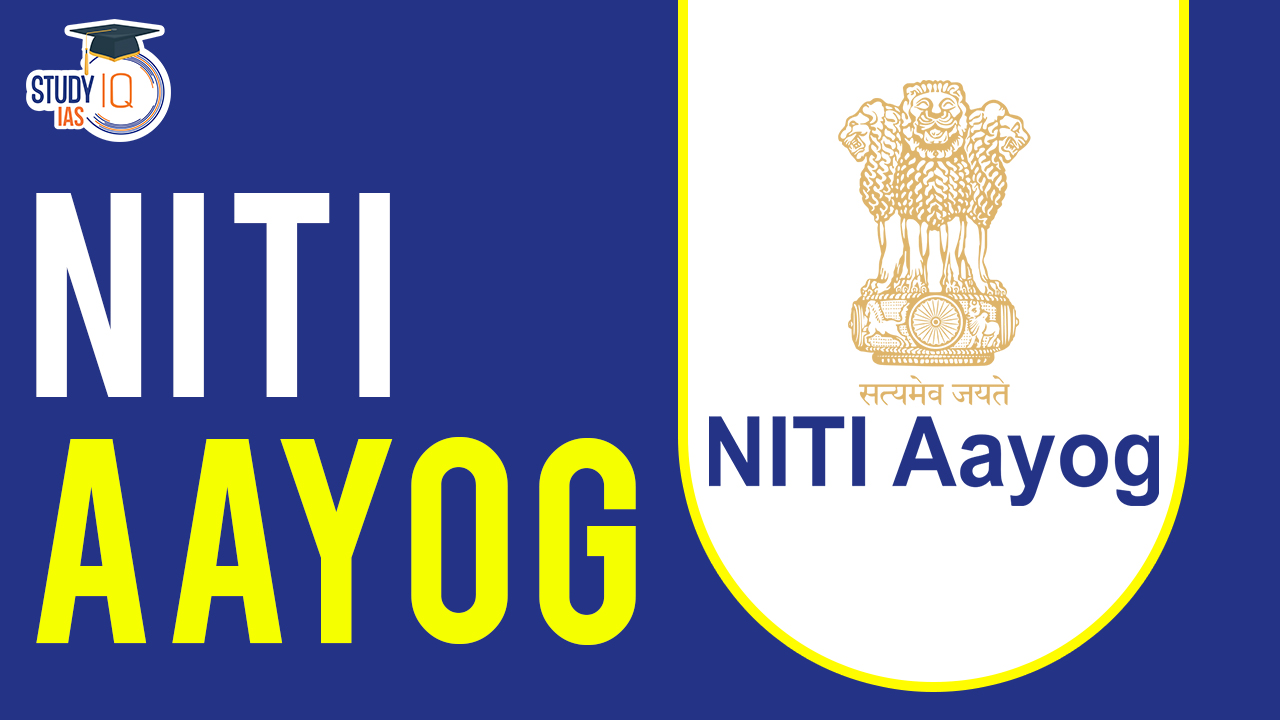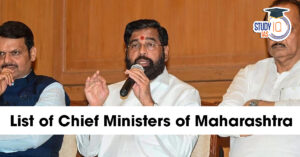Table of Contents
Context: NITI Aayog was formed to drive long-term planning, Centre–State coordination, and structural reforms, but a decade later, it is often seen as an armchair body focused more on reports and indices than real economic transformation.
Under his vision to bring all the states together as one “Team India” for a Viksit Bharat, Prime Minister Shri Narendra Modi will preside over the 10th NITI Aayog Governing Council Meeting on May 24, 2025, at Bharat Mandapam, New Delhi. This year’s theme is ‘Viksit Rajya for Viksit Bharat@2047‘, and the prime focus will be on states and, hence, emerging India as a developed nation. The Governing Council Meeting will address the strategy on Viksit Rajya for Viksit Bharat @2047.
Why NITI Aayog is Criticised as an “Armchair Institution”
Lack of Financial Powers
- Unlike the Planning Commission, NITI Aayog has no power to allocate funds.
- States see little incentive to engage seriously since financial transfers are handled by the Finance Ministry and Finance Commission.
Advisory Role Only
- Recommendations are non-binding on ministries and states.
- Ministries often ignore NITI Aayog’s policy suggestions, reducing it to a recommendatory think tank.
Weak Influence on Structural Reforms
- Limited say in big-ticket reforms such as disinvestment, labour codes, or fiscal policy.
- Its proposals on agriculture reforms, health policy, and education financing often remain unimplemented.
Overemphasis on Indices & Reports
- Aayog is better known today for publishing indices (Health, SDG, Innovation) than for driving transformative economic strategy.
- This “data obsession” risks reducing it to a statistical armchair institution.
Politicisation and Limited Autonomy
- Headed by the Prime Minister, with political appointees as Vice-Chairman and Members. Critics argue this makes it less of an independent policy body and more of a government mouthpiece.
Centralisation Concerns
- State governments often complain that their voices are not adequately factored into policy.
10th Governing Council Meeting of NITI Aayog
The 10th Governing Council meeting of NITI Aayog offers an opportunity to the Centre and States / Union Territories to discuss development issues confronting the country and evolve a consensus on how States can be the building blocks to make India a developed country, i.e., Viksit Rajya for Viksit Bharat. Initiatives for encouraging entrepreneurship, facilitating skilling, and generating sustainable employment opportunities nationwide will also be discussed in the meeting.
Attendees of the Meeting of NITI Aayog
The meeting is attended by:
- The Prime Minister (Chairman of NITI Aayog)
- Chief Ministers of all States and Union Territories with Legislatures
- Lieutenant Governors of other Union Territories
- Union Ministers (Ex-Officio Members)
- Vice Chairman, Members, and CEO of NITI Aayog
NITI Aayog Governing Council
The NITI Aayog Governing Council will also work to create a consensus on the topic of the 4th National Conference of Chief Secretaries organised between 13-15 December 2024. The Government of India Secretaries and the Chief Secretaries of all States and UTs were included in the consultative process to form the framework and submit suggestions regarding the agenda of ‘Viksit Bharat@2047’.
With the overall theme of ‘Promoting Entrepreneurship, Employment and Skilling- Leveraging the Demographic Dividend’, suggestions were proposed at the 4th National Conference of Chief Secretaries on the following six broad themes:
- Enabling Ecosystem creation – focus on Tier 2, 3 cities: Manufacturing;
- Enabling Ecosystem creation – focus on Tier 2, 3 cities: Services;
- MSME & Informal Employment: Rural Non-Farm;
- MSME & Informal Employment: Urban;
- Opportunities in the Green Economy: Renewable Energy, and
- Opportunities in the Green Economy: Circular Economy
About NITI Aayog
NITI Aayog, short for National Institution for Transforming India, is a policy think tank and government institution in India. It was established on January 1, 2015, to replace the Planning Commission.
NITI Aayog serves as a platform for cooperative federalism and policy formulation, focusing on fostering sustainable and inclusive economic growth, strategic thinking, and innovation. It works towards achieving development goals through collaborative efforts with state governments, experts, industry stakeholders, and international organisations.
NITI Aayog plays a vital role in shaping India’s development agenda, promoting reforms, and facilitating the implementation of transformative policies across various sectors.

Objectives of NITI Aayog
The objectives of NITI Aayog (National Institution for Transforming India) are as follows:
Foster Cooperative Federalism
NITI Aayog aims to promote cooperative federalism by facilitating collaboration and constructive engagement between the central government and state governments. It strives to ensure the active participation of states in the planning and decision-making process, fostering a more inclusive and decentralised approach to governance.
Policy Formulation and Implementation
NITI Aayog is responsible for formulating policies and strategic plans to address key developmental challenges and opportunities in various sectors. It conducts research, analysis, and consultations to develop innovative and evidence-based policies, focusing on sustainable economic growth, social welfare, and overall transformation.
Catalyze Reforms
NITI Aayog acts as a catalyst for reforms across sectors. It identifies policy bottlenecks, recommends policy changes, and promotes initiatives to foster efficiency, competitiveness, and productivity. The aim is to create an enabling environment for inclusive and sustainable development, promoting entrepreneurship, innovation, and ease of doing business.
Strengthen Monitoring and Evaluation
NITI Aayog focuses on monitoring and evaluating the implementation of programs and policies, assessing their impact and effectiveness. It adopts performance indicators, sets targets, and regularly tracks progress to ensure accountability, transparency, and efficient utilisation of resources.
Knowledge and Innovation Hub
NITI Aayog serves as a knowledge and innovation hub, engaging with experts, think tanks, and research institutions to gather insights, expertise, and best practices. It fosters collaboration, research partnerships, and knowledge-sharing to drive evidence-based policymaking and leverage technology for sustainable development.
International Engagement
NITI Aayog plays a vital role in fostering international cooperation and engagement. It represents India in international forums, promotes dialogue and collaboration with other countries, and leverages global best practices and experiences to inform India’s development strategies.
Functions of NITI Aayog
NITI Aayog (National Institution for Transforming India) performs a range of functions to support India’s development agenda. Some of the key functions performed by NITI Aayog are as follows:
- Policy Formulation: NITI Aayog is responsible for formulating policies and strategic plans to address developmental challenges and opportunities in various sectors. It conducts research, analysis, and consultations to develop innovative and evidence-based policies.
- Monitoring and Evaluation: NITI Aayog monitors and evaluates the implementation of programs and policies, assessing their impact and effectiveness. It sets performance indicators, tracks progress, and provides recommendations for improvements.
- Inter-governmental Coordination: NITI Aayog fosters cooperative federalism by facilitating collaboration and engagement between the central government and state governments. It acts as a platform for dialogue, coordination, and sharing of best practices among different levels of governance.
- Promoting Reforms: NITI Aayog acts as a catalyst for reforms across sectors. It identifies policy bottlenecks, recommends policy changes, and promotes initiatives to foster efficiency, competitiveness, and productivity.
- Research and Knowledge Sharing: NITI Aayog serves as a knowledge hub by engaging with experts, think tanks, and research institutions. It conducts research, promotes data-driven decision-making, and facilitates knowledge-sharing to inform policy formulation and implementation.
- Capacity Building: NITI Aayog focuses on capacity building by providing guidance, technical assistance, and training to stakeholders at various levels. It aims to enhance the capacity of government officials, institutions, and communities for the effective implementation of policies and programs.
- International Engagement: NITI Aayog represents India in international forums, promotes dialogue and collaboration with other countries, and leverages global best practices and experiences to inform India’s development strategies. It facilitates international cooperation and shares India’s experiences with other nations.
- Innovation and Entrepreneurship: NITI Aayog promotes innovation, entrepreneurship, and the start-up ecosystem in India. It supports initiatives and policies to foster a culture of innovation, technology adoption, and entrepreneurship, thereby driving economic growth and job creation.
These functions collectively contribute to NITI Aayog’s role in shaping India’s development agenda, fostering sustainable and inclusive growth, and facilitating effective governance through evidence-based policymaking and collaborative approaches.
NITI Aayog Structure
NITI Aayog has a hierarchical structure with different levels of authority and responsibility. The key components of its structure are as follows:
| Hierarchical Structure | Details |
| Governing Council |
|
| Regional Councils |
|
| Full-Time Members |
|
| Part-Time Members |
|
| Chief Executive Officer (CEO) |
|
| Experts and Professionals |
|
| Verticals/Divisions |
|
| Support Staff |
|
This hierarchical structure facilitates coordination, collaboration, and efficient functioning of NITI Aayog, ensuring effective policy formulation, implementation, and monitoring to achieve the institution’s objectives.
NITI Aayog Chairperson
NITI Aayog operates under the guidance and leadership of the Prime Minister of India. The Prime Minister serves as the de facto Chairperson of NITI Aayog and provides overall guidance and direction to the institution.
NITI Aayog Vice Chairman
Suman Bery currently holds the position of Vice Chairperson at NITI Aayog, with the rank and status equivalent to a Cabinet Minister. He succeeded Dr. Rajiv Kumar in 2022. With a wealth of experience as a policy economist and research administrator, Mr. Bery assumed the role of NITI Aayog Vice Chairperson on May 1, 2022. Before his appointment, he served as a Senior Visiting Fellow at the Centre for Policy Research in New Delhi.
Additionally, he held the position of Global Fellow in the Asia Programme at the Woodrow Wilson International Centre for Scholars in Washington, D.C. and was a non-resident fellow at Bruegel, an economic policy research institution based in Brussels. Mr. Bery also served as a board member of the Shakti Sustainable Energy Foundation in New Delhi.
NITI Aayog Report on India’s Hand and Power Tools Sector Potential
This NITI Aayog report explores the present scenario, problems, and vast potential of India’s power and hand tools industry and offers a strategic action plan to hugely enhance its international competitiveness and export performance.
Key highlights of NITI Aayog Report
- Ambitious Export Target: This report provides an ambitious target for India to reach $25 billion worth of exports by 2035 in the hand and power tools industry. This would entail capturing a 25% global market share of hand tools and a 10% global market share of power tools.
- Global Market Overview: The world market for power and hand tools is large, worth about $100 billion in 2022 and expected to reach $190 billion by 2035. The market is currently dominated by China, with a large portion of the world’s exports.
- India’s Current Status: India’s share in the world export market is limited, with $600 million worth of hand tool exports (1.8% market share) and $470 million worth of power tool exports (0.7% market share).
- Job Generation Potential: It can generate as many as 3.5 million jobs in India, potentially achieving the target of $25 billion in exports.
- Competitiveness Challenges: This report discovers that certain key issues that hinder India from competing in this sector effectively are a 14-17% cost disadvantage compared to China, due to raw material cost being higher, labour productivity being low, and logistical problems.
Major Initiatives of NITI Aayog
- Aspirational Districts Programme (ADP): Monitoring socio-economic indicators in 112 lagging districts.
- Atal Innovation Mission (AIM): Promoting startups, innovation labs in schools.
- SDG Index & Health Index: Ranking states on sustainable development and health outcomes.
- National Energy Policy / EV Roadmap: Advisory role in clean energy and mobility transition.
- Export Preparedness Index & Innovation Index: Benchmarking states on competitiveness.
- Strategic Policy Papers: Long-term strategy documents (e.g., India @ 75, Strategy for New India @ 75).

Way Forward
- Grant Financial Role: Some control over fund allocation to incentivise states to follow its policy advice.
- Strengthen Cooperative Federalism: Ensure genuine consultation and partnership with states.
- Focus on Implementation: Move beyond report-writing to actively monitor and support execution of reforms.
- Strengthen Autonomy: Reduce political interference, allow greater role for domain experts.
- Global Partnerships: Position NITI as a bridge between Indian economy and global best practices.
- Outcome-based Evaluation: Link its reports with concrete reforms and measurable economic impact.


 List of Chief Ministers of Maharashtra F...
List of Chief Ministers of Maharashtra F...
 Electoral System in India 2026: SIR Upda...
Electoral System in India 2026: SIR Upda...
 SLAPP Suits: Meaning, Examples, Impact o...
SLAPP Suits: Meaning, Examples, Impact o...

























